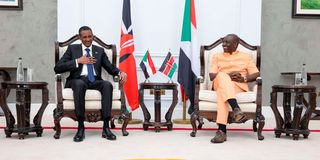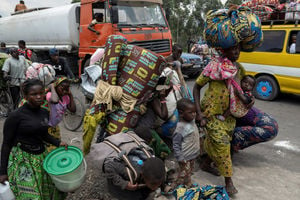
President William Ruto (right) and RSF Leader General Mohamed Hamdan Dagalo at State House, Nairobi.
It is Kenya’s third President, Mwai Kibaki, who famously said: “Leadership is a privilege to better the lives of others. It is not an opportunity to satisfy personal greed.” But Kenya now faces a real risk of international sanctions due to growing concerns about a new orgy of war profiteering.
Voice against the criminalisation of the Kenyan state grew bolder and louder from leaders, scholars and the youth during the Second Mwai Kibaki Annual Memorial Lecture held in Nairobi on April 11, 2022. The 2025 Kibaki lecture series focused on the development legacy of Kenya’s most consequential leader.
In 2006, then an émigré in South Africa, President Kibaki’s government invited me to head the taskforce within the Ministry of Foreign Affairs that drafted Kenya’s first-ever written Foreign Policy. This article draws from my brief remarks on the legacy of President Kibaki’s foreign policy on development.
In a nutshell, Kibaki bequeathed Kenya a foreign policy based on values, principles and a clear vision of a nation at peace with itself, its neighbours and the world. Kibaki was ideologically committed to a developmental state. The idea of a state-led macroeconomic planning became the cornerstone of Kenya’s foreign policy, not as an instrument of personal gain, but the surest way to grow the economy and lift Kenya’s poor out of poverty.
Second, like Singapore’s Lee Kuan Yew, Kibaki insisted on putting Kenya’s best and ablest in our diplomatic missions and offices abroad based on merit, particularly with regard to scientific or technical knowledge and special skills. It is careless and risky to use our diplomatic assets to reward jokers, cranks, charlatans and other cronies who cannot even tell what GDP means. For this reason, I was part of the team that helped establish the country’s Foreign Service Academy (FSA) to train diplomatic cadets and induct non-diplomats appointed to serve in our missions abroad.
Foreign policy
Third, Kibaki considered foreign policy as the sharpest weapon in our arsenal of promoting and defending our national interests, not personal whims and greed or kowtowing to ideologies and interests of others. Finally, Kibaki left behind a people-centered foreign policy that reflect the aspirations of the Kenyan people where diplomacy is propelled by Kenyan nationalism, pan-Africanism and the principles of humanism globally.
Kibaki’s foreign policy is not just the famed Look-East Policy. It was more complex, broader and ambitious. At its core was an African-centered approach as the centerpiece of Kenya’s foreign policy. This aimed to benefit from the continent’s huge resources and burgeoning market of over 1.3 billion people. Kibaki’s “Look East Policy” was a strategy to deepen economic ties with newly industrialized Asian economic powerhouses like China. But traditional ties with the West also mattered for Kibaki. However, these had to be re-engineered to fit Kenya’s national interests and development aspirations. Related to this, Kibaki invested in a ‘Look-South Policy’ as an approach to tap into the development potential of the emerging Global South, which represents 85 per cent of the world's population and nearly 39 percent of global GDP.
Sadly, upon coming to power in September 2022, President William Ruto turned the Kibaki-era foreign policy on its head. While paying lip-service to pan-Africanism, his government decidedly took a virulently pro-West turn, becoming America’s blue-eyed boy and top point-man for Washington’s interests in Africa.
Kenya was the net loser. After riding to power on a strong anti-China rhetoric, Nairobi’s government-to-government development cooperation with China, the world’s second largest economy and Kenya’s leading bilateral financier, grounded to a halt. Moreover, in its efforts to please Washington, Kenya, unwittingly, shunned the BRICS (Brazil, Russia, India, China, and South Africa), as other African economic powerhouses — Egypt, Ethiopia, and South Africa — became members. With Nigeria becoming a partner country of the grouping on January 17, 2025, Kenya was officially left as the lone regional power outside the strategic 10-member forum, which contributes over 40 per cent of the world's GDP growth (compared to 30 per cent held by the G7 countries), encompasses approximately 45 per cent of the world's population (4 billion people), produces 30 per cent of the world’s oil and holds a global wealth currently estimated at US$45 trillion in investable wealth.
Criminal state
Today, Kenya teeters on the precipice of becoming a pariah or criminal state and risks international sanctions in the wake of reports galore accusing the Ruto government of profiteering from Africa’s civil wars. In a no-holds-barred interview with KTN on April 7, 2025, former Deputy President Rigathi Gachagua asserted that his former boss is “the real commander” of the Rapid Support Forces (RSF) fighting the Khartoum government in the Sudanese civil war, which to date has killed over 150,000 people and violently displaced more than 11 million others.
President Ruto, he stated matter-of-factly, was conducting trade in illicit gold with the paramilitary group’s leader, Mohamed Hamdan Dagalo, alias Hemedti, and cleaning the money from the proceeds through Kenya to buy arms for the paramilitary force and finance its war. Sudan suspended all imports from Kenya, protesting what it described as actions “tantamount to an act of hostility”, meddling in its internal affairs and violating diplomatic norms and the African Union charter.
As Kinshasa’s officials accused Kenya of allowing the civilian wing of the Rwandan-backed M23 militia (Alliance Fleuve Congo) to operate out of Nairobi, Gachagua affirmed Kenya's involvement with M23.
Worse still, after President Donald Trump froze US funding for the United Security Council-backed multinational Security Support (MSS) Mission in Haiti, Kenya has reportedly resorted to funding its operations using taxpayers’ money, according to one public source. In the January-April hiatus, Treasury has used Sh4.6 billion in two tranches of Sh2.1 billion and Sh2.5 billion to fund what one online commentator described as “a vague, nefarious mission”. Damning evidence is emerging that the ruling elite pocketed billions from the illicit sale of 40,000 metric tonnes of fertilizer given free of charge to the Kenyan people by the Russian government, but repackaged and sold to Kenyan farmers at inflated prices.
As Kenya sinks to its lowest moment in its foreign policy, it needs to rise and return to the Kibaki-era diplomacy, people-centered diplomacy based on national interests and respect for international law.
Professor Peter Kagwanja is the Chairperson of the Organizing Committee of the Mwai Kibaki Annual Memorial Lecture and the Chief Executive of the Africa Policy Institute (API).






